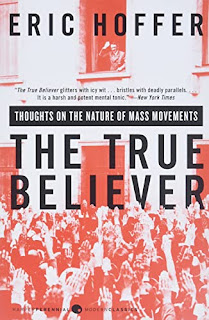The True Believer
My sister lent me this fascinating short book, which was published in 1951. Eric Hoffer was not an academic or famous intellectual; he was self-educated and worked as a longshoreman, and he was a thinker with plenty of experience of the world. He wrote ten books, apparently mostly "in his spare time while living in the railroad yards." This book is a collection of observations and thoughts on, well, the nature of mass movements -- not just in the 20th century, though that's a lot of it, but all over the place. Religions, rebellions, and takeovers through history are the grist for his mill.
Though there are footnotes, this is not what we would think of as an academic treatise. It's Hoffer giving us his thoughts, and he doesn't expect us to agree with everything; indeed some things are overdone to make an interesting point. Because I'm reading it with 70 more years of history gone, it's quite interesting to see him say something that points to the rise of a Castro or a Mao.
Mostly I just want to share/record the bits I marked for myself. A really interesting work, and I recommend.
When hopes and dreams are loose in the streets, it is well for the timid to lock doors, shutter windows and lie low until the wrath has passed. For there is often a monstrous incongruity between the hopes, however noble and tender, and the action which follows them. It is as if ivied maidens and garlanded youths were to herald the four horsemen of the apocalypse.
For men to plunge headlong into an undertaking of vast change, they must be intensely discontented yet not destitute, and they must have the feeling that by the possession of some potent doctrine, infallible leader or some new technique they have access to a source of irresistible power. They must also have an extravagant conception of the prospects and potentialities of the future. Finally, they must be wholly ignorant of the difficulties involved in their vast undertaking. Experience is a handicap.
Unless a man has the talents to make something of himself, freedom is an irksome burden. Of what avail is freedom to choose if the self be ineffectual? We join a mass movement to escape individual responsibility, or, in the words of the ardent young Nazi, "to be free from freedom."
Poverty when coupled with creativeness is usually free of frustration. This is true of the poor artisan skilled in his trade and of the poor writer, artist and scientist in the full possession of creative powers. ...The decline of handicrafts in modern times is perhaps one of the causes for the rise of frustration and the increased susceptibility of the individual to mass movements.
Hatred is the most accessible and comprehensive of all unifying agents. It pulls and whirls the individual away from his own self, makes him oblivious of his weal and future, frees him of jealousies and self-seeking. He becomes an anonymous particle quivering with a craving to fuse and coalesce with his like into one flaming mass. Heine suggests that what Christian love cannot do is effected my a common hatred.
[on the ideal object of hatred, which should be omnipotent, omnipresent, and]..the ideal devil is a foreigner. To qualify as a devil, a domestic enemy must be given a foreign ancestry. Hitler found it easy to brand the German Jews as foreigners. The Russian revolutionary agitators emphasized the foreign origin of the Russian aristocracy. In the French Revolution the aristocrats were seen as 'descendants of barbarous Germans, while French commoners were descendants of civilized Gauls and Romans.' In the Puritan Revolution the royalists 'were labeled "Normans," descendants of a group of foreign invaders.'
It is easier to hate an enemy with much good in him than one who is all bad. We cannot hate those we despise...The Americans are poor haters in international affairs because of their innate feeling of superiority over all foreigners. An American's hatred for a fellow American is far more virulent than any antipathy he can work up against foreigners....Should Americans begin to hate foreigners whole-heartedly, it will be an indication that they have lost confidence in their own way of life.
...when we renounce the self and become part of a compact whole, we not only renounce personal advantage but are also rid of personal responsibility. There is no telling to what extremes of cruelty and ruthlessness a man will go when he is freed from the fears, hesitations, doubts ,and the vague stirrings of decency that go with individual judgement. When we lose our individual independence in the corporateness of a mass movement, we find a new freedom -- freedom to hate, bully, like, torture, murder and betray without shame and remorse. Herein undoubtedly lies part of the attractiveness of a mass movement.
Mass movements make extensive use of suspicion in their machinery of domination...Fear of one's neighbors, one's friends and even one's relatives seems to be the rule within all mass movements. Now and then innocent people are deliberately accused and sacrificed in order to keep suspicion alive. Suspicion is given a sharp edge by associating all opposition within the ranks with the enemy threatening the movement from without. This enemy -- the indispensable devil of every mass movement -- is omnipresent. He plots both outside and inside the rants of the faithful...If anything goes wrong within the movement, it is his doing. It is the sacred duty of the true believer to be suspicious. He must be constantly on the lookout for saboteurs, spies and traitors.





I read this a few years ago. It's pretty fascinating, isn't it? And I also copied out the passage beginning, "It is easier to hate an enemy..."
ReplyDelete